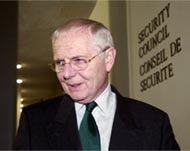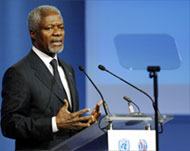UN agrees reform-linked budget
The UN General Assembly has passed a budget with an unprecedented spending cap aimed at pressuring countries into approving management and other reforms within six months.

Under the deal between wealthy and developing nations, the assembly adopted on Friday a resolution for a two-year, $3.8 billion administrative budget, averting a financial crisis.
But the resolution capped UN spending at $950 million – only enough for the first six months of 2006 – after which Kofi Annan, the UN secretary-general, has to ask the assembly for more funds to pay staff.
The 191-nation General Assembly’s decision was taken by consensus, without a vote.
Several nations, including Egypt, India and Jamaica, refused to link reforms to the budget.
But John Bolton, the US ambassador to the UN, said this was implicit since the assembly would have to approve additional funding in six months’ time.
Bolton called the pact a victory for the United States, saying: “[Washington] obtained something it had been striving for the last three months – clear linkage between management reform and the budget process at the United Nations.”
EU credit
But in a rare public disagreement, the European Union, headed by Britain, took credit for the compromise.
 |
|
Jones Parry said the EU must |
Emyr Jones Parry, Britain‘s ambassador to the UN, said: “[For] 95% of the time, it has been us who have been building a bridge with the G-77”.
He said the EU objective was to “avoid confrontation but give an impetus to the reform process”.
France was even blunter. Jean-Marc de la Sabliere, France‘s UN ambassador, said: “The European Union was at the centre of the game. The United States, Japan and the G-77 were compelled to make compromises.”.
Stafford Neil, Jamaica‘s ambassador, representing the G-77 nations, said he had fought hard against the spending cap.
His group had reluctantly gone along after receiving assurances that the tactic was a one-time measure that would not be repeated in future years.
Reforms and funding
Neil insisted there was no linkage between implementing reforms and UN funding for the second half of 2006 because the additional monies would depend on Annan’s recommendation.
 |
|
Kofi Annan has been calling for |
Negotiators had been working against a midnight 31 December deadline for the General Assembly to either approve a budget plan or trigger a shutdown of the United Nations.
Rich countries as well as Annan have been pushing hard for management reforms following allegations of corruption and mismanagement at the world body, particularly in its handling of the oil-for-food programme for Iraq.
Included among the reforms that the General Assembly must approve are a new human rights body, new international accounting standards, a review of programmes older than five years and a stronger internal watchdog office.